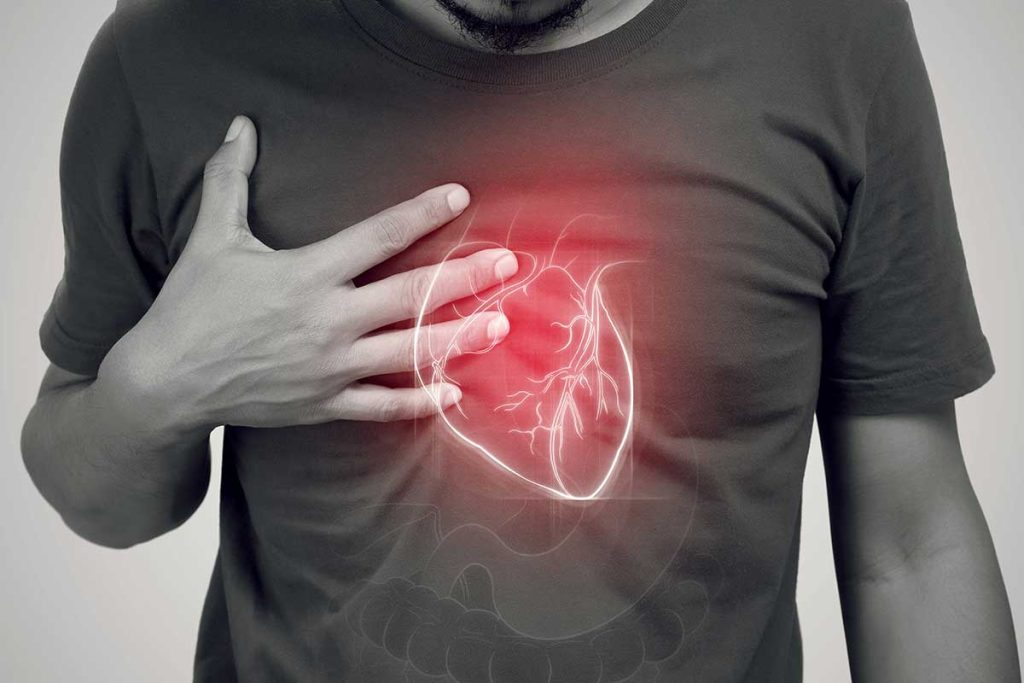Chest Pain or Angina Specialist in Michigan
At CardioQ, we specialize in providing expert care and treatment to patients with chest pain and angina in Michigan. Our team of experienced specialists is dedicated to providing the highest quality care to help patients manage their symptoms and improve their quality of life.
We understand that chest pain and angina can be a serious and often debilitating condition that requires expert care and treatment. That’s why we use advanced diagnostic tools and the latest treatment options to provide personalized care to each of our patients.
Whether you are experiencing chest pain or have been diagnosed with angina, our cardiologist is here to help. We take the time to listen to your concerns, answer your questions, and develop a personalized treatment plan that is tailored to your specific needs.
At CardioQ, we are committed to providing the best possible care to our patients.
Contact us today to schedule an appointment with one of our experienced chest pain and angina specialists and experience the difference of working with a team that truly cares about your health and well-being.


Chest Pain or Angina
Chest Pain or Angina can be serious. It may be caused by temporary poor blood flow to the heart (angina), or by a sudden blockage in the coronary arteries resulting in a heart attack.
At CardioQ, our Angina Specialist in Michigan can help you in Angina Treatment.
In a heart attack, every minute counts. Urgent treatment is needed to prevent damage to the heart.
There are other possible causes of chest pain (Angina) such as indigestion and muscle strain. Aside from the heart, many parts of the chest that can cause chest pain include the lungs, oesophagus (gullet), muscle, bone and skin.
Because of the complex system of nerves in the body, the cause of the chest pain (Angina) may come from elsewhere in your body, such as your stomach (abdomen). This is known as ‘referred pain’.

Heart Related Chest Pain
Although chest pain is often associated with heart disease, many people with heart disease say they experience a vague discomfort that isn’t necessarily identified as pain.
In general, chest discomfort related to a heart attack or another heart problem may be described by or associated with one or more of the following:
- Pressure, fullness, burning or tightness in your chest.
- Crushing or searing pain that radiates to your back, neck, jaw, shoulders, and one or both arms.
- Pain that lasts more than a few minutes, gets worse with activity, goes away and comes back, or varies in intensity.
- Shortness of breath.
- Cold sweats.
- Dizziness or weakness.
- Nausea or vomiting.
Other Types of Chest Pain
It can be difficult to distinguish heart-related chest pain from other types of chest pain. However, chest pain that is less likely due to a heart problem is more often associated with:
- A sour taste or a sensation of food re-entering your mouth.
- Trouble swallowing.
- Pain that gets better or worse when you change your body position.
- Pain that intensifies when you breathe deeply or cough.
- Tenderness when you push on your chest.
- Pain that is persistently present for many hours.
The classic symptoms of heartburn — a painful, burning sensation behind your breastbone — can be caused by problems with your heart or your stomach.
Common questions
If you have chest pain, you may feel an aching pressure throughout your chest. You might also feel squeezing, crushing, or stabbing pain. These symptoms can develop slowly or appear without warning.
Some people with chest pain may feel discomfort in their jaw, back, neck, or arms. Depending on what’s causing your pain, you might notice other symptoms, including:
- Shortness of breath
- Sweating
- Dizziness
- Muscle weakness
- Nausea or vomiting
Not all cases of chest pain are life-threatening. Heartburn or a simple muscle strain can cause chest pain, too. But if you experience chest pain for the first time, it’s best to seek medical advice and Angina Treatment from Angina Specialist in Michigan at CardioQ. If your pain suddenly worsens, you may need immediate care.
While there are many possible causes of chest pain, it’s a common symptom of a heart attack. A heart attack occurs when blood flow to your coronary arteries is blocked. Most heart attacks result from a blood clot or buildup of cholesterol. They can also be linked to tobacco or drug use.
Chest pain can be a sign of other cardiovascular problems, including:
- Angina
- Aortic dissection
- Pericarditis
At CardioQ – Heart & Wellness Center, your Chest Pain Specialist in Michigan gets to the root of the problem. They perform a comprehensive exam, including laboratory tests and imaging studies.
The team determines what’s causing your symptoms and develops a customized treatment plan.
If your pain is coming from a blood clot in your arteries, your provider may prescribe medication. Blood thinners and artery relaxers can help blood flow more easily. These drugs can also prevent new clots from forming.
Angina Specialist in Michigan at CardioQ – Heart & Wellness Center offers specialized care for blood clots, including a pulmonary embolism response team (PERT). If you have a blocked artery, the team delivers swift evaluation and treatment. They provide the care you need to prevent a health emergency.
In some cases, you may need surgery to remove the blockage. The team uses state-of-the-art techniques, including robotic surgery and heart catheterization, to remove blockages. Chest Pain Specialist in Michigan at CardioQ – Heart & Wellness Center delivers exceptional care before and after your procedure.
No matter what your health needs, the team provides an accurate diagnosis for Angina Treatment. They support you throughout your recovery and deliver follow-up care.
